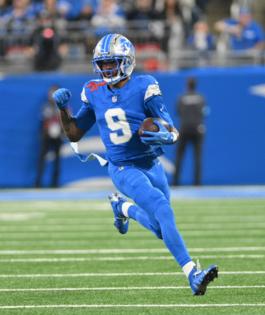Lions receiver Jameson Williams won't be charged in concealed-weapon case: prosecutor
Published in Football
DETROIT — Detroit Lions wide receiver Jameson Williams won't be charged in relation to a traffic stop last month in which two guns were found in the car, Wayne County Prosecutor Kym Worthy's office announced Monday.
Prosecutors had been investigating the case since Williams was arrested, then released, at the scene of a traffic stop in the early-morning hours of Oct. 8.
“We have looked at this case thoroughly and objectively," Worthy said in a news release. "We did not consider that Mr. Williams is a Detroit professional athlete in our decision-making. We have charged Detroit area athletes before and would not have hesitated to do so again if the facts of this case could be proven beyond a reasonable doubt."
Williams was riding in the passenger seat of a black sedan driven by his brother on Oct. 8 when the two were pulled over during a traffic stop at about 1:02 a.m.
Police stopped the car because its license plate was obscured and Williams' brother was speeding and driving recklessly, according to prosecutors.
Williams' brother provided police with his valid Concealed Pistol License and told officers there were two weapons in the car: one registered to him and the other to Williams, authorities said.
Police retrieved Williams' gun from the front passenger floorboard and his brother's from the rear passenger floorboard behind the driver.
Officers found Williams did not have a CPL. He was arrested for carrying a concealed weapon and officers placed him in handcuffs at the scene. He was later released at the scene when a Detroit police supervisor arrived, prosecutors said.
Police referred the case to the prosecutor's office. On Monday, police responded to the announcement that Williams would not face charges:
"The DPD extends its gratitude to the Wayne County Prosecutor’s Office for their thoughtful deliberation of this complex legal matter," police said in a statement to The Detroit News following Monday's announcement. "This case illustrates just how challenging on-scene arrest determinations and subsequent charging decisions can be in new and unique situations, such as the one here. While no charges will be issued in this case, as an agency, we echo Prosecutor Worthy’s sentiment that no one is above the law."
Worthy said that if Williams' gun had been found on his person, he would have been charged. However, a team of lawyers examined the facts and could find no prior cases that matched the specific circumstances of this incident and no law relating to whether one person’s CPL can "extend" to another person’s weapon to spare the passenger from criminal liability.
Authorities said the law's purpose is to create standards to prevent criminals and violent individuals from obtaining a license to carry a concealed firearm, and "there are no facts in this case that would support a finding that Mr. Williams is a criminal or dangerous individual."
“While no case has identical facts, we can look at similar facts, if possible, to aid us in our decision-making. We really could not recall any case that had facts that mirrored this case. Every case is fact-specific. As always, we apply the alleged facts to the existing law. And the applicable law and its accompanying legislative history is far from clear.
Worthy urged lawmakers to consider the case in legislative session.
“The CPL holder here was the driver and had care, custody, and control of the car," she said. "Guidance is needed for the future on how many weapons can a valid CPL say that they have control over?"
The prosecutor's office said the brothers explained the reckless driving that led to the initial traffic stop by saying, "They were making sure they were not being followed because Mr. Williams is a member of the Detroit Lions."
Williams' brother was issued traffic citations.
____
©2024 The Detroit News. Visit detroitnews.com. Distributed by Tribune Content Agency, LLC.







Comments